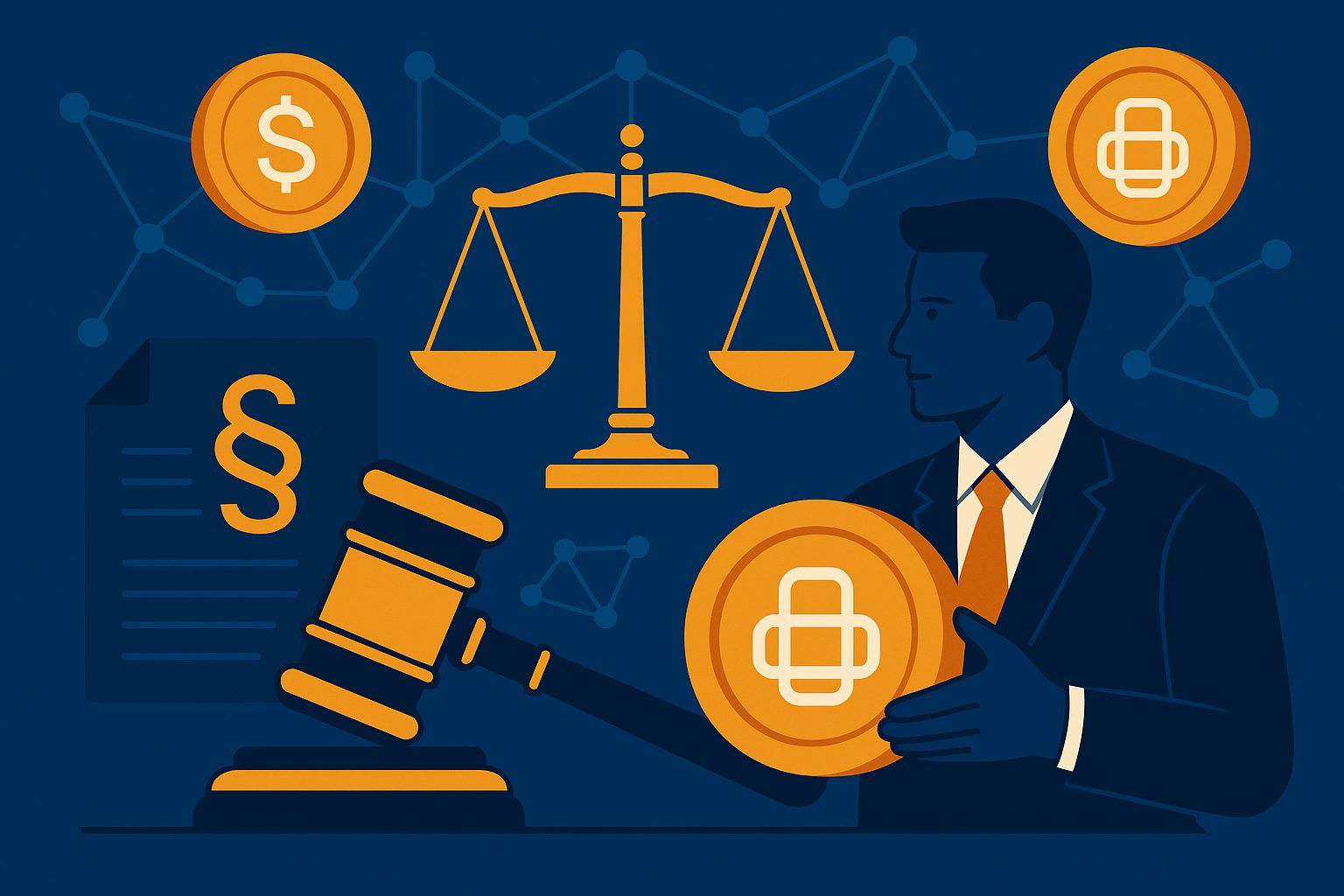Setting the Stage: The Rising Regulatory Tide
The Web3 revolution has unlocked extraordinary opportunities for protocol innovation, community governance, and tokenized economies. Yet, as founders chart bold trajectories into decentralized frontiers, they must navigate a complex and evolving legal landscape. Globally, regulators are zeroing in on token sales, treating them not merely as novel crowdfunding mechanisms, but as potential securities offerings, commodities, or new asset classes altogether. Ignoring these legal imperatives risks enforcement actions, fines, and reputational damage that can derail even the most promising ventures. For Web3 founders, understanding the contours of this regulatory tide isn’t an optional checkbox—it’s the keystone of sustainable growth. In this section, we’ll explore why legal foresight is as critical as technical excellence when raising tokens.
Token Classification: Decoding Securities, Utilities, and Hybrids
At the heart of any token raise lies a fundamental question: how will regulators classify your token? The answer shapes prospectus requirements, disclosure obligations, and permissible investor pools. In jurisdictions like the United States, regulators apply the “Howey Test” to determine whether a token constitutes a security. If investors expect profit derived from the efforts of others, your token offering may fall under securities laws—triggering rigorous registration or exemption filings. Elsewhere, tokens deemed utilities evade stringent securities rules but may still face consumer protection standards. Emerging regulatory frameworks in Europe, Asia, and Latin America sometimes recognize hybrid tokens that straddle both categories. Web3 founders must scrutinize token attributes—governance rights, revenue-sharing models, transferability—and consult local guidelines to ascertain the correct classification. Missteps can lead to retroactive enforcement, buyer rescissions, or costly delisting by exchanges.
Jurisdictional Junctions: Selecting Your Legal Home
Choosing the legal domicile for your token entity is akin to plotting a starship’s course through a regulatory galaxy—each jurisdiction offers different winds and gravitational forces. Some founders gravitate toward Switzerland’s “Crypto Valley,” where the Financial Market Supervisory Authority (FINMA) provides clear guidance on token categorization and exempt offerings. Others prefer Singapore’s progressive stance under the Monetary Authority of Singapore (MAS), which welcomes utility token sales while embedding robust AML/KYC rules. In the United States, states such as Wyoming have enacted blockchain-friendly statutes, even as the Securities and Exchange Commission (SEC) maintains a conservative, enforcement-driven approach. Alternative options include Dubai’s Virtual Asset Regulatory Authority (VARA) or Gibraltar’s Distributed Ledger Technology (DLT) Framework. When evaluating jurisdictions, weigh factors like tax regimes, regulatory clarity, operational costs, and investor confidence. A carefully chosen domicile streamlines compliance and signals credibility to institutional partners.
Structuring Your Token Sale: Compliance by Design
Crafting a compliant token sale demands a delicate dance between marketing appeal and regulatory rigor. Founders must determine the optimal structure for public, private, and pre-sale rounds, each with distinct legal considerations. Public sales open to retail investors often require extensive disclosures and securities registrations in multiple territories. Private placements to accredited investors can leverage exemptions but impose strict investor accreditation verification. Some protocols adopt dual-token models—issuing a utility token for public use and a security token for institutional backers—thus adhering to varied regulatory regimes. Token sale agreements, subscription documents, and terms of sale should articulate investor rights, refund policies, and lock-up periods in clear, unambiguous language. Embedding compliance into your tokenomics—limiting transferability, enforcing on-chain holder caps, or delegating voting rights—creates a robust legal framework that protects both your project and your community of supporters.
KYC/AML Safeguards: Protecting Against Financial Crime
As token economies scale, they attract heightened scrutiny from financial crime watchdogs seeking to curb money laundering, terrorist financing, and fraud. Anti-Money Laundering (AML) and Know Your Customer (KYC) protocols form the backbone of compliant token sales. Whether you engage a third-party identity services provider or build in-house solutions, collecting and verifying participant identities is non-negotiable for regulatory acceptance—especially in public and private sales targeting global investors. Procedures must align with regional AML laws, from the European Union’s 6th Anti-Money Laundering Directive to the U.S. Bank Secrecy Act. Robust transaction monitoring, suspicious activity reporting, and record-keeping practices safeguard your protocol from inadvertent facilitation of illicit finance. By integrating KYC/AML tools early, founders demonstrate a commitment to legal integrity, boosting confidence among exchanges, custodians, and institutional participants.
Whitepapers and Disclosures: Transparency as a Legal Shield
A meticulously drafted whitepaper is more than a marketing artifact; it serves as a critical legal disclosure document. Regulators view whitepapers as de facto prospectuses, and any misstatements—whether about token utility, funding allocation, or technical functionality—can trigger enforcement. To fortify your whitepaper as a legal shield, clearly describe your project’s vision, team credentials, token distribution model, use of proceeds, risk factors, and governance mechanisms. Avoid hyperbolic language or absolute promises; instead, ground every claim in verifiable data and realistic timelines. Consider adding a dedicated “Legal Notice” section that outlines the document’s scope, jurisdictional disclaimers, and investor suitability criteria. By treating your whitepaper as a binding disclosure instrument, you minimize the risk of litigation and establish a transparent baseline for regulatory review.
Data Privacy and User Protection: Navigating GDPR and Beyond
Beyond token sales, Web3 projects handle personal data—wallet addresses, KYC records, and user interactions—that fall under global privacy regulations. The European Union’s General Data Protection Regulation (GDPR) sets a high bar for data subject rights, imposing requirements for lawful processing, purpose limitation, and storage minimization. Other regions, including Brazil’s LGPD and California’s CCPA, echo similar protections. Founders must map data flows, obtain explicit consent for personal data collection, and establish procedures for data access, correction, and erasure requests. While blockchain’s immutability poses unique challenges for “right to be forgotten” requests, designs that decouple personal identifiers from on-chain records—via hash references or off-chain storage—can mitigate compliance risks. A robust privacy policy, accessible on your website, demonstrates respect for user rights and aligns your project with emerging global data protection standards.
Intellectual Property Safeguards: Guarding Your Innovations
In the fast-paced Web3 arena, intellectual property (IP) issues move to the forefront as projects evolve into established protocols and platforms. Founders should secure trademarks for project names and logos, protecting brand identity against dilution and cybersquatting. Patent strategies—while less conventional in open-source communities—can safeguard novel consensus mechanisms, cryptographic algorithms, or unique tokenomic architectures. At the same time, licensing choices for code repositories determine how your developer community can use, modify, or commercialize your innovations. Open-source licenses such as MIT or Apache 2.0 encourage adoption and collaboration, while more restrictive copyleft licenses preserve communal benefit. Clearly articulated contributor license agreements (CLAs) and copyright assignments clarify ownership and prevent future disputes. By weaving IP strategy into your legal playbook, you lay the groundwork for strategic partnerships, ecosystem growth, and defensible market positioning.
Tax Implications: Preparing for the IRS and Global Agencies
Tokens represent more than utility or governance—they often constitute taxable events. Token sales generate revenue that, in many jurisdictions, triggers income recognition, capital gains, or value-added tax (VAT) obligations. Founders must categorize token sale proceeds correctly: is your token a commodity, a service, or a security? This classification affects whether transactions are subject to sales tax, VAT, or income tax. Additionally, token grants to employees, advisors, or ecosystem builders may be considered compensation, requiring payroll tax withholding or social security contributions. Some countries impose crypto-specific reporting mandates, compelling entities to file token transaction summaries or maintain detailed accounting records. Engaging experienced tax counsel—well-versed in both blockchain and international tax treaties—ensures you design token distributions and treasury management practices that optimize tax efficiency while remaining fully compliant.
Ongoing Compliance: Building a Sustainable Legal Framework
Compliance isn’t a one-time checklist—it’s a continuous, evolving process. As your protocol grows through successive token events, secondary market listings, and governance proposals, new regulatory considerations will emerge. Maintaining relationships with legal advisors, participating in industry working groups, and monitoring updates from regulators like the SEC, FCA, or MAS helps you anticipate changes and adapt swiftly. Establish internal compliance policies—complete with regular audits, training programs for key personnel, and incident response protocols—to institutionalize legal rigor across your organization. When significant regulatory developments occur—such as new stablecoin guidelines or MiCAR regulations in Europe—your team can assess impacts, update legal documentation, and recalibrate token sale strategies without missing a beat. A proactive stance on compliance builds resilience and positions your project as a trusted steward in the decentralized economy.
Partnering with Experts: Legal Counsel and Advisory Boards
No Web3 founder should face the legal frontier alone. Partnering with specialized counsel—law firms and boutique practices focused on blockchain and digital assets—provides nuanced guidance through complex regulatory regimes. Beyond traditional lawyers, consider forming advisory boards that include former regulators, compliance officers, and financial crime specialists who can offer strategic insights and credibility. Engage these experts early—during token design and documentation phases—so their feedback shapes critical decisions rather than serving as a retroactive sanity check. Additionally, leverage industry associations and self-regulatory organizations (SROs) such as the Crypto Rating Council (CRC) or International Token Standardization Association (ITSA) to stay aligned with best practices and emerging norms. A robust network of experts ensures you navigate legal challenges with confidence, turning compliance from a burden into a competitive differentiator.
Looking Ahead: Future-Proofing Your Token Launch
The Web3 legal landscape will continue to shift as regulators refine policies and new jurisdictions enter the fray. Tomorrow’s token sales may involve decentralized identity attestations, zero-knowledge proof compliance, or tokenized securities platforms fully integrated with traditional capital markets. Founders should architect token frameworks—and associated legal structures—to accommodate future innovations, such as on-chain governance mandates or dynamic regulatory oracles that trigger compliance actions automatically. Embedding flexibility into your token smart contracts—enabling upgrades or pausing mechanisms—allows your protocol to pivot rapidly in response to new legal requirements. Cultivating an agile legal strategy, anchored by a culture of continuous learning and expert collaboration, will empower Web3 founders to launch tokens that not only comply today but remain resilient amid tomorrow’s regulatory evolution.




